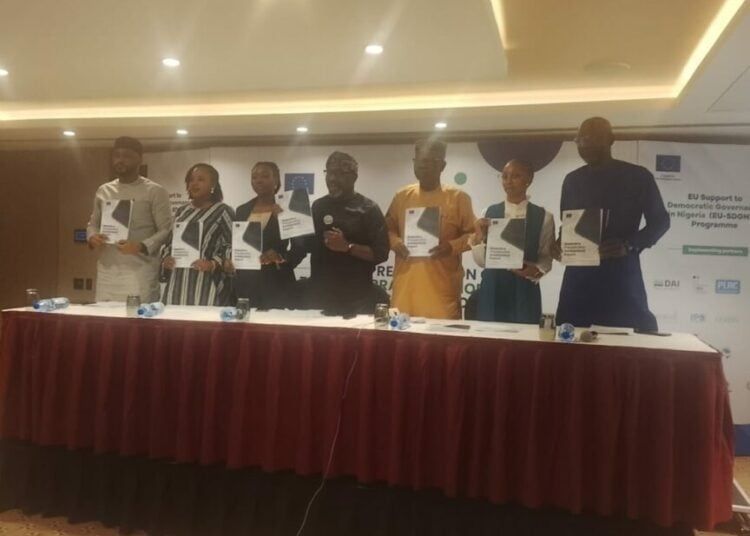Ahead of the November 8, 2025, governorship election in Anambra State, the European Union Support to Democratic Governance in Nigeria Phase II (EU-SDGN II) implementing partners have called for strict enforcement of penalties against vote buying and other electoral offences.
Speaking on behalf of 16 civil society organisations (CSOs) during a media briefing in Abuja, the Executive Director of the International Press Centre (IPC), Mr. Lanre Arogundade, urged the Independent National Electoral Commission (INEC), the Nigeria Police Force, and the Economic and Financial Crimes Commission (EFCC) to take decisive action to curb electoral malpractice.
Arogundade made the call during the public presentation of the Anambra Governorship Pre-Election Assessment Report, noting that enforcing sanctions on electoral offences was critical to restoring public confidence in Nigeria’s electoral system.
“Enforcing penalties for vote buying and other electoral crimes is central to restoring citizens’ confidence in Nigeria’s elections. We call on INEC, security agencies, and the EFCC to be proactive in detecting and apprehending offenders during campaigns and on election day,” he said.
The pre-election assessment, which covered developments from June to September 2025, evaluated Anambra’s political climate, institutional preparedness, and security outlook.
The report noted intense competition among the All Progressives Grand Alliance (APGA), Peoples Democratic Party (PDP), All Progressives Congress (APC), and Labour Party (LP), but raised concerns over insecurity, misuse of vigilante groups, and weak electoral infrastructure—particularly after violent incidents during the August 2025 by-election.
The EU-SDGN partners warned that persistent issues such as voter apathy, vote buying, and insecurity threaten the integrity of the electoral process.
Citing data from INEC, the report revealed that voter turnout during the 2021 Anambra governorship election stood at just 10.2 percent—the lowest in Nigeria’s electoral history. It cautioned that turnout could decline further if urgent steps were not taken to rebuild voter trust and deter inducement.
“In a state with a proud political culture, voter apathy and the monetisation of elections are deeply troubling. Democracy cannot thrive where votes are bought and citizens feel their choices no longer matter,” the report stated.
The report also identified insecurity, including cult-related violence, kidnappings, and disinformation campaigns, as major deterrents to voter participation. It recommended excluding non-statutory security outfits such as vigilante groups from election duties while reinforcing police neutrality and professionalism.
While commending INEC for registering over 168,000 new voters—mostly women and youths—the report flagged recurring logistical challenges, including delayed polling unit openings, BVAS malfunctioning, and limited accessibility for persons with disabilities (PWDs).
It urged INEC to strengthen its logistics chain and ensure timely deployment of election materials and personnel.
On media safety, the partners expressed concern over harassment and restricted access for journalists in high-risk areas. They proposed the establishment of a Media-Security Desk in Anambra to protect press freedom during the election period.
The report also decried the low representation of women, with only two female governorship candidates among 16 political parties. It called on INEC to deploy at least one female official per polling unit and collect gender-disaggregated data to promote inclusivity.
For persons with disabilities, the report noted that while 86 percent had collected their voter cards, most polling units remained physically inaccessible. It recommended the provision of ramps, tactile paths, braille guides, magnifiers, and sign language interpreters at polling stations.
Summarising their recommendations, the EU-SDGN partners emphasized the need for stronger enforcement of electoral laws, improved voter education, and enhanced inter-agency coordination.
“The credibility of the Anambra election will not be measured only by the votes counted but by how inclusive, peaceful, and transparent the process is. Anambra can prove that democracy in Nigeria remains credible and resilient,” they said.
The EU-SDGN II programme, funded by the European Union, brings together 16 Nigerian and international CSOs, including DAI Global Belgium SRL, International IDEA, YIAGA Africa, PLAC, The Kukah Centre, IPC, CEMESO, TAF Africa, NWTF, ElectHER, SOS Children’s Villages, CISLAC, CAPPA, and Justice, Development and Peace organisations from Osogbo, Ekiti, and other regions.














